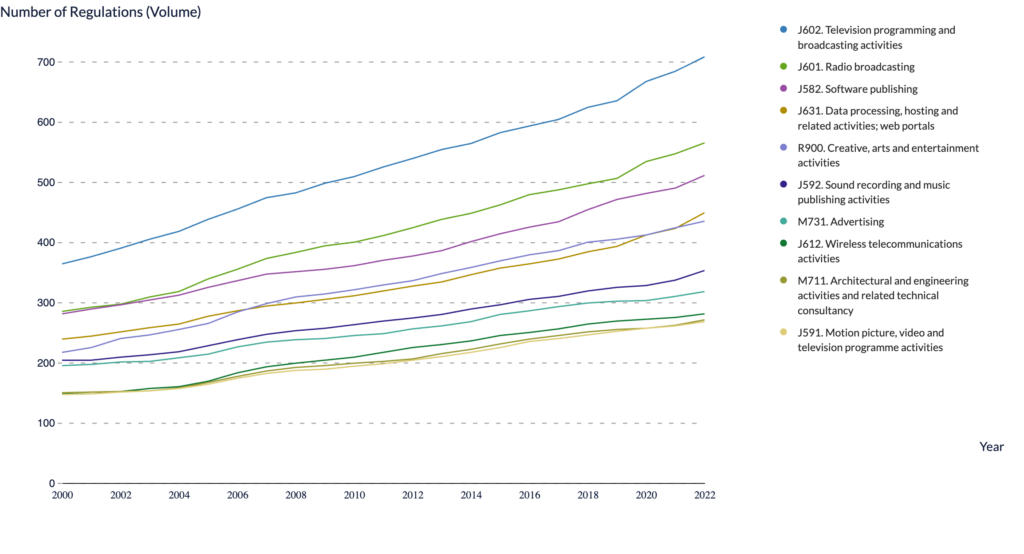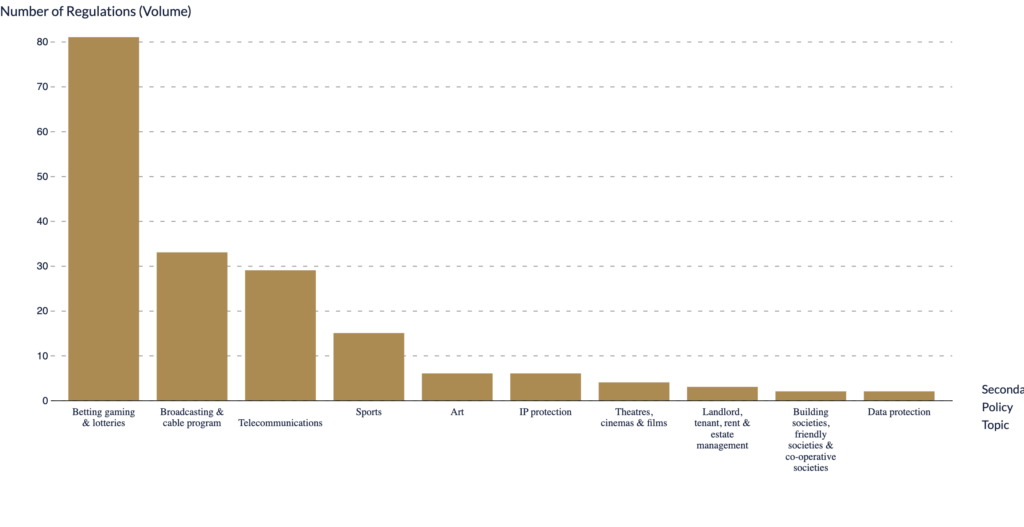
On 8 February 2023, Prime Minister Rishi Sunak created four new government departments, splitting the Department of Business, Energy and Industrial Strategy (BEIS) to create a standalone energy department and “refocus” the Department for Culture, Media and Sport (DCMS).
So now, DCMS has been replaced by the Department for Science, Innovation and Technology and the Department for Culture, Media and Sport. The refocused department will recognise the importance of these industries to the economy and work to further position the UK as a leader in the creative arts.
But at this time, it is unclear who will be responsible for addressing some of the marketing industry’s most pressing issues, including who will be responsible for things like the online safety bill, the digital skills gap, the future of public service broadcasting, and the UK’s GDPR replacement after Brexit.
Regulation Overview
The DCMS implements government policies in arts and culture, communications and media, sport, tourism, establishing a shared society, and digital connection. The DCMS Outcome Delivery Plan describes how the department plans to deliver its objectives, measure its success, and ensure it continuously improves.
The key objectives listed in the document are:
- Boost economic growth and productivity by enhancing digital connectivity (Supporting departments: Department for Transport and Ministry of Housing, Communities & Local Government).
- Develop and diversify our sectors at home and abroad, especially those sectors most impacted by COVID-19, such as culture, sport, civil society, and the creative industries.
- Increase growth by expanding the use of data and digital technology and increasing innovation, while reducing digital harms to the UK’s economy, security and society.
- Strengthen the cohesion of our communities and nations through major events and ceremonial occasions, and decrease inequalities of participation in society, particularly among young people.
UK Creative Industries Regulations Overtime
The UK creative sector is defined as “those industries that are based on individual creativity, skill and talent that has the potential to create wealth and jobs through developing intellectual property”. In 1997, an elected labour government in the UK decided to try to define them and evaluate their direct influence on the British economy. The DCMS published Creative Industries – Mapping Document 1998, which listed 13 areas of activity. Since then, this document has had significant influence and sparked fierce controversy.
The UK government has recognised the importance of the creative sector and has launched several initiatives to support its development and growth. For example, it published the Creative Industries Sector Deal, which outlined a series of commitments and actions to boost the productivity, innovation, and skills of the sector. It also established the Creative Industries Council, which is a joint forum between the government and creative industry leaders to address strategic issues affecting the sector.
However, there are also some challenges and criticisms regarding the regulation of the creative sector. For example:
- Some regulations may be outdated, inconsistent, or unclear, which can create confusion and uncertainty for businesses and consumers.
- Some regulations may be too restrictive or burdensome, which can stifle creativity, innovation, and competitiveness.
- Some regulations may not reflect the diversity and needs of the creative sector, which can limit its potential and representation.

The graph shows that all industries have experienced an increase in the number of regulations over time but at different rates and levels. The gap between the industries has also widened over time, indicating that they face different regulatory pressures and challenges.
Some possible reasons for the increase in regulations are:
- The growth and diversification of the creative sector which requires more rules and standards to ensure quality, safety, and fairness.
- The impact of technological changes, such as digitalisation, convergence, and innovation, which create new opportunities and challenges for the creative sector.
- The influence of external factors, such as Brexit, COVID-19, and globalisation, which affect the trade, movement, and collaboration of the creative sector with other countries and regions.
Therefore, it is important for the government, policy maker and creative industry to work together to ensure that the regulation of the creative sector is effective, proportionate, and responsive to its changing needs and circumstances. This can help to foster a thriving and sustainable creative sector that contributes to the economic and social well-being of the UK.
DCMS Regulations on Different Policies
The DCMS Committee, on behalf of the House of Commons and the voters, monitors the Department for Culture, Media and Sport and its related bodies, including the BBC. In 2021-22, the DCMS spent about £8.2 billion on initiatives in arts and culture, communications and media, sport, tourism, and digital connectivity.
It also engages in inquiries into current topics of interest within its scope, such as:
- Future of the BBC
- New developments in broadcasting
- Regulation in gambling
- Promote women’s sport
- Equitable Distribution of Arts Council Funds

The graph shows some interesting patterns about the DCMS regulations on different policies. The highest number of regulations is for “Betting, gaming & lotteries”: this may reflect the complexity and diversity of this sector, which includes online gambling, casinos, bingo halls, lotteries, and gaming machines. The DCMS works with the Gambling Commission, which is an independent statutory body that regulates gambling activities in Great Britain. Some of the regulations that apply to this policy topic are the Gambling Act 2005 and the Gambling (Licensing and Advertising) Act 2014.
The lowest number of regulations is for “Data protection & website”. This may indicate that this sector is relatively new and evolving and that the DCMS relies on other bodies to regulate it. For example, the Information Commissioner’s Office (ICO) is an independent authority that upholds UK information rights and data protection. Some of the regulations that apply to this policy topic are the Data Protection Act 2018, the Privacy and Electronic Communications Regulations 2003, and the Electronic Commerce Regulations 2002.
DCMS Regulations on Different Sectors
DCMS has issued different regulations for different sectors, depending on the nature and impact of their activities. Some of these regulations are based on internal or UK-agreed definitions based on the Standard Industrial Classification of Economic Activities 2007 (UK SIC 2007). This allows for the use of nationally uniform data sources and worldwide comparisons.
The graph shows the number of regulations (volume) for different SIC groups that fall under the DCMS sectors. It also shows the number of regulations with exemption and without exemption for each SIC group. The exemption means that some businesses or activities are not subject to the regulation or have reduced requirements, usually based on their size, turnover or impact.

Conclusion
As demonstrated by the recent restructuring of the DCMS into the Department for Science, Innovation and Technology and the Department for Culture, Media and Sport, the regulatory framework governing these sectors is subject to constant evolution. This transformation reflects the UK’s recognition of these industries’ pivotal role in the nation’s economy and global reputation.
Law Notion is an empowering tool that distils legal complexities into actionable insights, facilitating rapid comprehension of regulatory shifts. Its adaptability ensures that policymakers and regulators can promptly grasp the implications of changing regulations, enabling informed decision-making and agile responses.
Contact Law Notion today and take advantage of the legal intelligence powered by AI.
